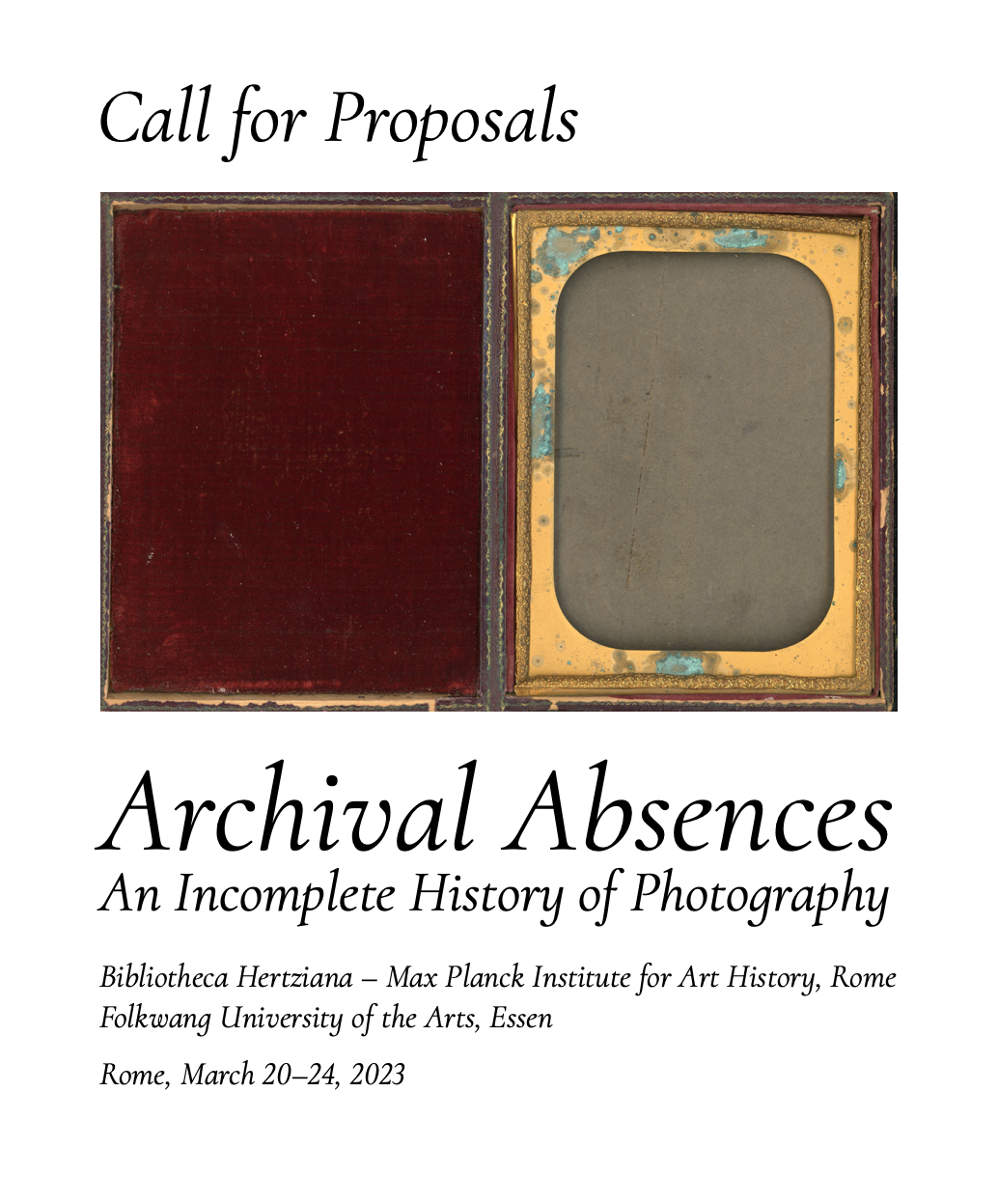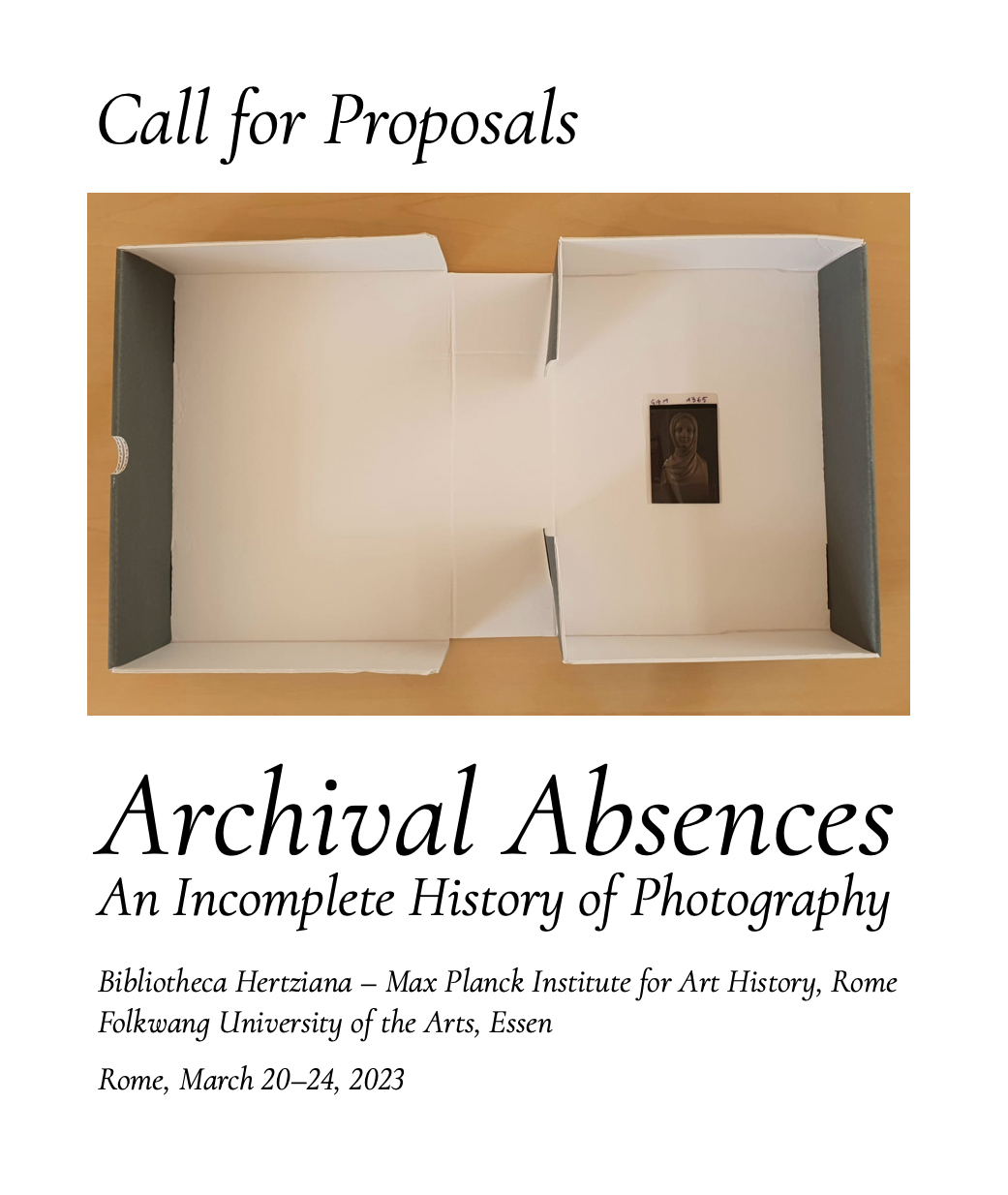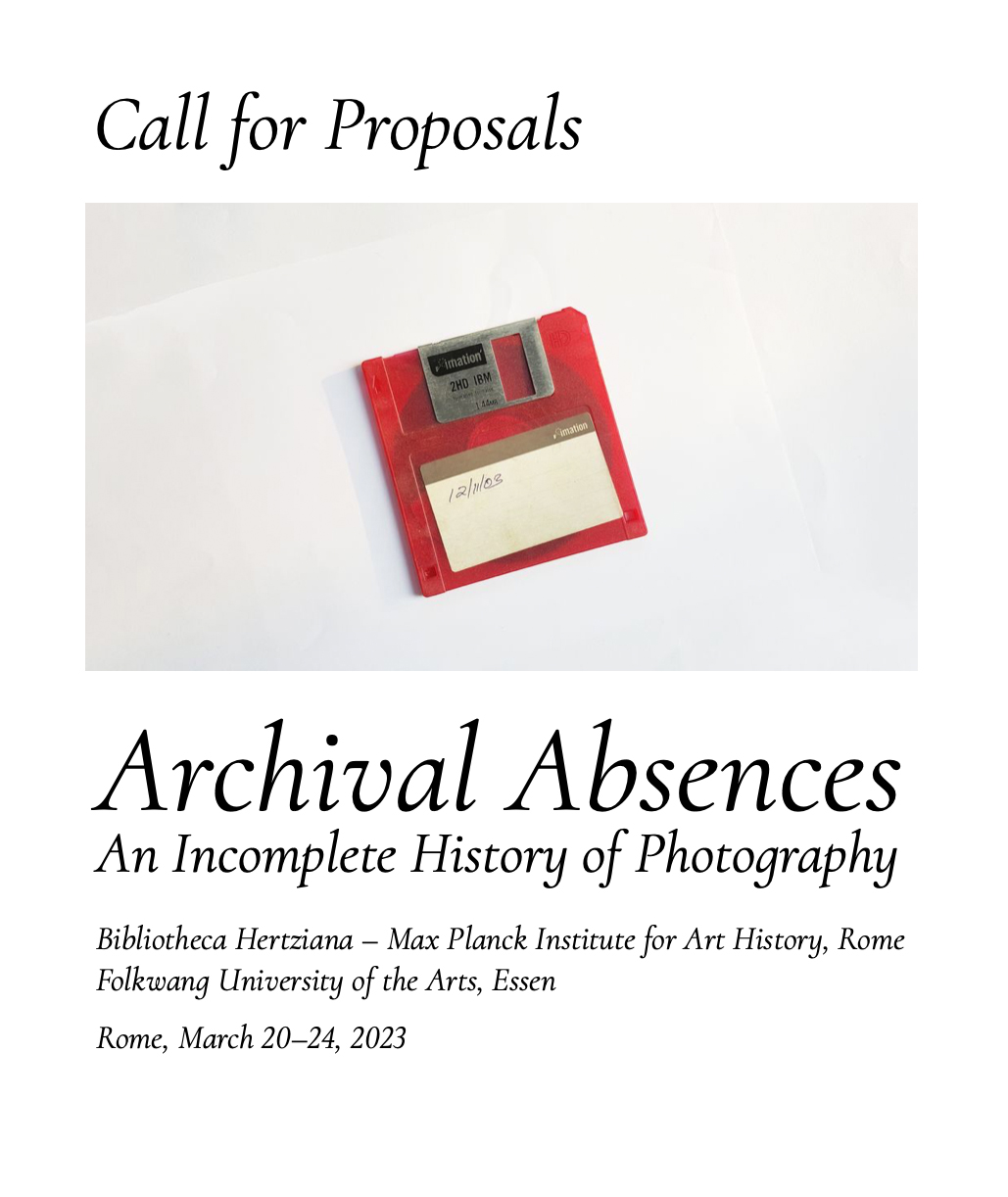Archival Absences



20.10.2022
For the second time, the Bibliotheca Hertziana, the Max Planck Institute for Art History in Rome, and Folkwang University of the Arts, Essen, invite emerging doctoral and post-doctoral scholars, working in the interdisciplinary field of theory and history of photography, to participate in and contribute to a photo-historical seminar. Next year’s topic is
Archival Absences
An Incomplete History of Photography
It will be organized and led by Tatjana Bartsch (Bibliotheca Hertziana), Elizabeth Otto (University at Buffalo), Johannes Röll (Bibliotheca Hertziana), and Steffen Siegel (Folkwang University of the Arts, Essen) and is supported by the Alfried Krupp von Bohlen und Halbach Stiftung, Essen.
Rome, Bibliotheca Hertziana, Max Planck Institute for Art History
March 20–24, 2023
Deadline for applications: October 20, 2022
Here is a PDF of this call.
Photo-historical research engages a vast array of materials. Scholars working in this field grapple with photographic images of all kinds—from Nicéphore Niépce’s heliographs to the most recent digital imagery. They are attentive to technologies of photographic production and reproduction as well as to the discourses and practices that frame the images. In manifold ways, photo historians can feel lured by the richness of relevant production and tradition. In other words, photography as a medium is not only easily accessed by countless users for many purposes; from a scholarly point of view, it is also a medium that encompasses a mass of researchable resources, a sheer abundance of personal collections and institutional holdings so vast it might even threaten to overwhelm the scholar.
Despite the massive accumulations of diverse material that potentially fall within the purview of histories of photography, such histories can never be considered »completed.« Instead, they are always partial, shaped by researchers’ interests and questions, conscious and unconscious decisions they make and the materials they are able to access. Like the production of photographs themselves, scholars’ work is framed by what Laura Wexler has called a »set of choices« akin to the crops and omissions that delineate the limits of photography’s purported offer of a window into the past. Paradoxically, the most comprehensive photographic collections and archives most clearly reveal not just the excellence of their own holdings, but also the lapses, gaps, exclusions, and oversights within those holdings. Our written approaches to the histories of photography replicate these relationships between what is present and absent, visible and invisible, available and inaccessible, preserved and lost.
These observations are our point of departure for the research seminar titled »Archival Absences: An Incomplete History of Photography.« Following on the Bibliotheca Hertziana in Rome and the Folkwang University of the Arts in Essen’s initiative for interdisciplinary seminars on the theory and history of photography—founded with the first seminar in 2019 and, beginning this year, supported by the Alfried Krupp von Bohlen und Halbach Stiftung—we are pleased to announce the second such program that invites advanced Ph.D. students and recent post-doctoral scholars to present and discuss their research. With the seminar, we aim to2 develop a focused, multi-disciplinary analysis of the material, institutional, and even personal conditions that shape photo-historical practices of researching, writing, and publishing.
We seek to explore diverse means of knowledge production and methods for probing, mitigating, or bridging archival absences of many kinds. For as much as it is true that photo-historical research can claim an overwhelming opulence of sources, the opposite is always also true: in some cases, the archives’ silences are deafening. We want to delve into the significance of what we do not see, read, and experience, what we do not address, question, and investigate—and the reasons for these absences. We want to query the forces that control the possibility of becoming, being, and remaining present—and, as a corresponding other half of a pendant pair—the power of absence.
Over the past decades, research, especially from feminist and post-colonial perspectives, has offered substantial questions, arguments, and methods for identifying and confronting absences. This research shows the importance of addressing two interrelated lines of questioning: what is missing from the archives, and what is missing in our critical discourses? Drawing on both aspects, we invite applications from emerging scholars who will present new scholarship and, in the context of a week-long seminar, discuss a set of questions that relate to materials and institutions, methods and research fields, canons and historiographies. Among the relevant questions that applicants may wish to consider and that will shape the seminar are:
— What views have photographers captured? What have they missed, and why?
— What logics determine the creation and evolution of archives, analog and digital? How are archives shaped by the epistemic moments of their making, and how do they serve certain histories while betraying others? To what extent do photographers, archivists, or curators rely upon trends, past and present, to shape their photographic inquiries?
— What impacts do disciplinary frames have when it comes to archival care for photo-historical materials and also to scholarly interest? Should we valorize the diverse institutional cultures of presence and absence that prevail in various archives, libraries, and museums?
— How and why do archives select particular materials to collect and thus foster their privileged roles in creating visual histories? How and why do institutions exclude, neglect, or deaccession other materials? What is the impact of objects’ existence in analog or digital formats upon their perceived relevance for scholarly scrutiny?
— Which methods do we pursue when we search the content of an archive? How can we detect, distinguish, and address different types of absences, archival holdings as well as strands of research interests? How do we address the myriad negative spaces that constitute an archive as much as its accessible contents do?
— How do we address the photographic objects, traditions, and indeed entire histories that have been forgotten, damaged, destroyed, suppressed, censored, excluded, vanished, disappeared, or simply lost?
— How do we treat visual objects that, for religious, cultural, or personal reasons, were never intended to be collected or viewed publicly?
— How do we mark the incompleteness of our historiographic work? What theoretical ideas, such as »critical fabulation,« enable us to redress these absences? Can research on archival absences constitute another kind of presence?
— Can photo-historical research practices that address questions of being present or absent serve as role models for other disciplines? Relatedly, how can photo scholars learn from other disciplines grappling with a comparable set of problems?
We welcome proposals from Ph.D. students already in the dissertation phase and recent post-doctoral scholars (maximum of three years since degree) in art history and related disciplines with a strong photo-historical component. The seminar language will be English. All participants will present some aspect of their current research projects, which must relate to the program’s subject matter. Visits to several photographic archives in Rome will be an integral part of the seminar.
The Bibliotheca Hertziana will provide lodging in double rooms and reimburse the incurred expenses for traveling economy class up to 500 euros. In addition, participants will receive a modest daily allowance.
Please upload the following application materials as PDF documents by October 20, 2022, on the platform Selectus
— Title and a 500-word abstract of the proposed topic (all participants will give a 30-minute formal presentation)
— Brief CV (Maximum 3 pages)
— Brief summary of your dissertation or postdoctoral project
— Names and contact details of two references
Questions and queries may be sent to: fototeca@biblhertz.it
The first seminar was followed by the publication of Circulating Photographs, a special issue of »History of Photography«, vol. 45, issue 1, 2021, co-edited by Antonella Pelizzari and Steffen Siegel. The organizers anticipate selecting a limited number of the 2023 seminar’s final papers for publication in a similar volume.